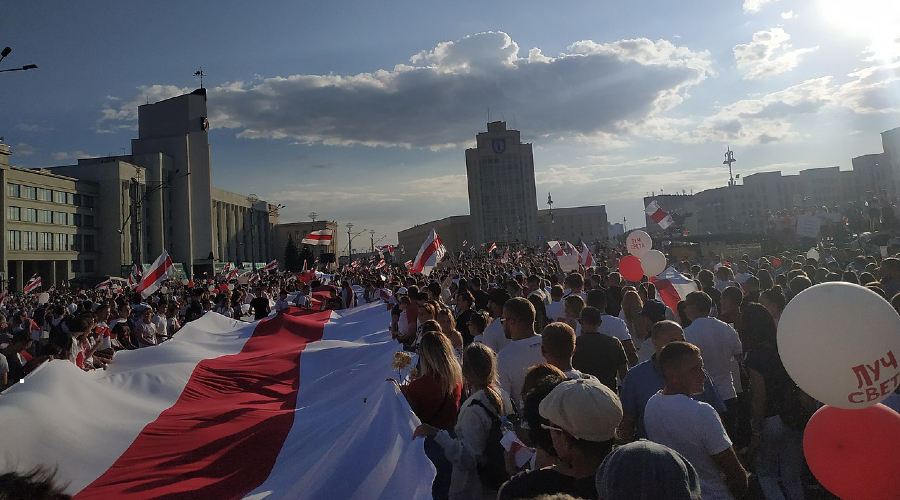Five Ways Telecommunications Companies Can Fight Internet Shutdowns
Telecommunications companies and rights groups can accomplish more by working together to push back internet disruptions.

Published by The Lawfare Institute
in Cooperation With

Editor’s Note: Governments often ask telecommunications companies to shut down the internet in their country or otherwise limit their citizens' access and activities. Companies are in a bind, balancing their legal obligations to the government and human rights that depend on free communications. David Sullivan of the Global Network Initiative details options for telecommunications companies that enable them to comply with the law while limiting the human rights impact of any shutdown.
Daniel Byman
***
From telemedicine and online education to Zoom weddings and funerals, people rely on digital technologies like never before. And yet governments around the world continue to order internet and mobile network disruptions. These disruptions range from the yearlong blackout in Jammu and Kashmir, where connectivity is still being restored in dribs and drabs, to recent disruptions in response to unrest in Ethiopia and protests in Belarus.
Internet blackouts and other disruptions put governments and companies in tension. Internet and telecommunications providers are caught between their legal obligations to the state and their human rights responsibilities to their customers. Because of this, digital rights advocates have sometimes seen companies as adversaries when they cooperate with orders to limit or shut off services. But new research demonstrates a set of practical steps companies caught between these competing pressures can take to uphold their responsibilities and work together with advocates to discourage government disruption orders.
National security and public safety are critical responsibilities of governments. There are narrow circumstances—such as an imminent threat of a mobile-detonated bomb—in which network disruptions by the government could be justified, but in practice, disruptions are far more often used to silence dissent, stop peaceful protests and inhibit reporting on human rights issues. Emerging research from India suggests that shutdowns often fail to quell protest movements and lead protestors to adopt more violent tactics “that are less reliant on effective communication and coordination.” Many governments nevertheless have laws on their books authorizing shutdowns, and others continue to order them despite a lack of legal authorization. These laws and actions are backed up by the constitution of the International Telecommunication Union, which, in Articles 34 and 35, provides governments the right to block telecommunications for security purposes and to suspend international telecommunications service.
National laws reflect these provisions, often granting governments broad leeway to make demands of telecommunications providers. In the Democratic Republic of Congo, for instance, Article 46 of the country’s telecommunications Framework Law stresses national security but also allows the government to block the use of telecommunications infrastructure for “any other reason.” In the United States, FCC Commissioner Jessica Rosenworcel recently warned that “if a sitting president wants to shut down the Internet or selectively cut off a social media outlet or other service, all it takes is an opinion from his attorney general that Section 706 [of the Communications Act of 1934] gives him the authority to do so.”
As rights advocates fight network shutdowns by urging governments to #KeepItOn and #LetTheNetWork, the question of what the companies on the receiving end of shutdown orders can and should do when faced with them continues to loom large.
Mobile network operators, or telcos, have close relationships with governments around the world. Many are wholly or partly government owned, or were so in the not-too-distant past. Governments are their regulators but also often some of their biggest customers.
According to the U.N. Guiding Principles on Business and Human Rights, when telcos find themselves caught between their legal obligations to the government and their responsibility to respect human rights, “business enterprises are expected to respect the principles of internationally recognized human rights to the greatest extent possible in the circumstances, and to be able to demonstrate their efforts in this regard.”
What this means in practice varies considerably. When—as happened during Egypt’s infamous 2011 internet blackout—armed soldiers storm the office and make demands, companies have an obligation to seek to ensure the safety of their personnel. But that neither supplants companies’ broader responsibilities nor exhausts the options they can employ.
The laws that govern disruptions give governments far-reaching authority to order disruptions for vague reasons, often under the cover of strict gag orders. This makes it hard for the public to understand whether companies are doing all they can to fight network disruptions. But a growing group of companies are opening up their operations to scrutiny by human rights experts and providing critical insights. Earlier this year, my organization, the Global Network Initiative, completed its first independent assessments of six telcos (together with five other information and communications technology companies) on their freedom of expression and privacy practices, including their responses to network disruptions.
These assessments, which included six case studies that explored in detail how companies responded to disruptions in seven countries, provide an initial set of good practices that the wider telecommunications industry should uphold when confronted with shutdowns.
First, companies should clarify their legal obligations. The case studies showed that national legal frameworks and license obligations failed to provide appropriate legal clarity, which constrained the ability of companies to challenge government demands for shutdowns and restrictions. Rather than ceding to governments the interpretation of the law, companies should gather expertise from legal counsel and outside experts to inform users of what governments may properly demand and guide their next steps.
Second, document everything. Documenting and escalating demands, using properly established policies and procedures, can give companies room for maneuver when dealing with government orders. This is particularly important since these orders are usually made during emergencies and require a rapid response. Although verbal orders are permitted by law in many jurisdictions, companies can nonetheless put in place procedures to document such orders and escalate them to their headquarters for senior executive review. At minimum, documenting and escalating can prevent situations in which a shutdown order is implemented locally without the awareness of headquarters. These mitigation measures can also buy time, create opportunities to consult with other companies and consider a joint response, and help track trends over time to understand changes in the number, duration and scale of disruptions.
Third, narrow disruptions as much as possible. Companies may not be in a position to refuse a disruption order, but they can find ways of engaging with authorities to minimize its negative effects on human rights by narrowing its scope. For example, although the blocking of specific sites and platforms damages freedom of expression, it is a significantly less bad outcome than a wholesale internet blackout. Companies can also work to narrow the duration or geographic scope of a disruption, or try to exempt infrastructure like hospitals from its effect. For example, in response to orders to shut down services around prisons in Central America, mobile operators have developed alternative technical solutions to reduce the impact of these measures on nearby communities.
Fourth, increase transparency. Although companies may be legally limited in their ability to communicate about shutdowns, there are a variety of means by which they can increase transparency. When they are not prohibited from communication, they can notify users about government-imposed disruptions, as Telenor has done during the ongoing shutdown in Rakhine State in Myanmar. Another step is for companies to resist requests that they issue public statements providing a false reason—such as technical difficulties—for a government-ordered disruption. Companies can also include information on network disruptions in their transparency reports.
Fifth, advocate with allies. One of the reasons human rights experts vigorously oppose shutdowns is that they are so obviously overbroad and rarely the least intrusive way to deal with the threat perceived by the government. But the breadth of actors affected by disruptions means that there is a diverse coalition of allies and arguments that could be activated to advocate against them. Companies can and should support such collaborative advocacy. Research supported by companies and conducted by think tanks, consulting firms and nongovernmental organizations has contributed to litigation against shutdowns in Pakistan and built an evidence base for understanding the economic costs of disruptions.
Telcos are in a tough spot when ordered to shut down their services, and digital rights advocates may be understandably tempted to view telcos as adversaries. But the evidence shows that companies and rights groups can accomplish more by working together than at cross purposes when it comes to pushing back against shutdown orders and dissuading governments from ordering them in the first place.





